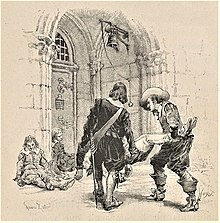Vingt ans après
 |
|
| Author |
Alexandre Dumas in collaboration with Auguste Maquet |
|---|---|
| Original title | Vingt ans après |
| Cover artist | Maurice Leloir |
| Country | France |
| Language | Translated from French |
| Genre | Historical, romantic |
|
Publication date
|
French, serialized 1845 |
Twenty Years After (French: Vingt ans après) is a novel by Alexandre Dumas, first serialized from January to August 1845. A book of The d'Artagnan Romances, it is a sequel to The Three Musketeers and precedes The Vicomte de Bragelonne (which includes the sub-plot Man in the Iron Mask).
The novel follows events in France during the Fronde, during the childhood reign of Louis XIV, and in England near the end of the English Civil War, leading up to the victory of Oliver Cromwell and the execution of King Charles I. Through the words of the main characters, particularly Athos, Dumas comes out on the side of the monarchy in general, or at least the text often praises the idea of benevolent royalty. His musketeers are valiant and just in their efforts to protect young Louis XIV and the doomed Charles I from their attackers.
The action begins during the regency of Queen Anne of Austria, with Cardinal Mazarin as First Minister. D'Artagnan, who seemed to have a promising career ahead of him at the end of The Three Musketeers, has for twenty years remained a lieutenant, and seems unlikely to progress despite his ambition and the debt the queen owes him. He is summoned by Mazarin, who requires an escort; the French people detest Mazarin, and are on the brink of rebellion (La Fronde). D'Artagnan is sent to the Bastille to retrieve a prisoner, who turns out to be his former adversary, the Comte de Rochefort.
After renewing his acquaintance with d'Artagnan and making a promise to aid his advancement, Rochefort is brought to his audience with Mazarin, where he learns that the cause for his imprisonment was his refusal to serve Mazarin at an earlier stage. He does, however, remember his promise, and though he offers his own service to Mazarin, he refuses to watch over the Duc de Beaufort, who is imprisoned at the time, and soon learns that, in consequence, he is to be returned to the Bastille, though this does not deter him from speaking highly of the achievements of d'Artagnan and the Three Musketeers.
...
Wikipedia
